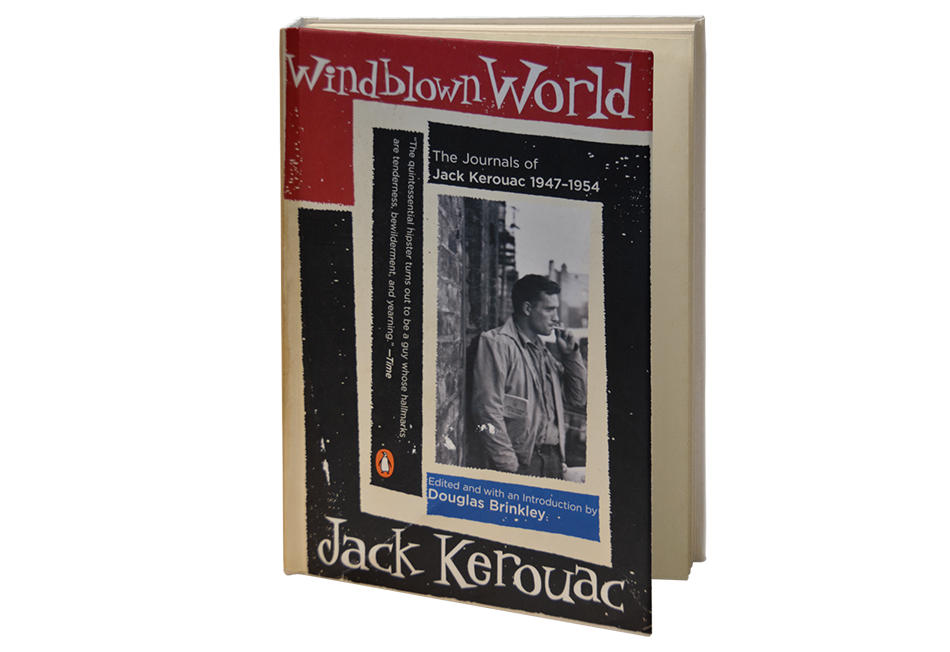Jack Kerouac is best known through the image he put forth in autobiographical novels. Yet only his private journals, in which he catalogued his innermost feelings, that reveal to us the real Kerouac —his true, honest deep philosophical self.
In Windblown World, distinguished historian Douglas Brinkley has gathered together a selection of journal entries from the most pivotal period of Kerouac’s intrepid life, beginning in 1947 when he was twenty-five years old and ending in 1954. Truly a self-portrait of the artist as a young man, these journals show a sensitive soul charting his own progress as a writer and responding to his most important literary forebears, which include Dostoevsky, Tolstoy, Spengler, Joyce, Twain, and Thomas Wolfe. Here is Kerouac as a hungry young writer struggling to perfect and finish his first novel, The Town and the City, while forging crucial friendships with Allen Ginsberg, William S. Burroughs, and Neal Cassady. The Journals go on to tell of the events that would eventually be immortalized in On The Road, as Kerouac travels through every region of the country and slowly cultivates his idea for a jazz novel. The peripatetic Kerouac’s lifelong devotion to mystical catholicism and his tremendous love of “the essential and everlasting America” abound in these confessional pages, as do his brooding melancholy, his youthful doubts and chronic fears, and his overriding conviction that there would soon be a “great new evolution of the soul.”
As Brinkley notes in his introduction, Windblown World, “offers riveting proof of Kerouac’s deep desire to become a great and enduring American Novelist. Brimming with youthful innocence and the coming-of-age struggle to make sense out of a sinful world, these pages reveal an earnest artist trying to discover his authentic voice.”
“Powerful winds that crack the boughs of November! — and the bright calm, sun untouched by the furies of the earth, abandoning the earth to darkness, and wild forlornness, and night, as men shiver in their coats and hurry home. And then the lights of home glowing in those desolate deeps. There are the stars, though! High and sparkling in a spiritual firmament. We will walk in the windsweeps, gloating in the envelopment of ourselves, seeking the sudden grinning intelligence of humanity below these abysmal beauties. Now the roaring midnight, fury and the creaking of our hinges and windows, now the winter, now the understanding of the earth and our being on it: this drama of enigmas the double depths and sorrow and grave joys, these human things in the elemental vastness of the windblown world.”
— Jack Kerouac journal entry November 12, 1947
Jack Kerouac was born in Lowell, Massachusetts, in 1922 and died in St. Petersburg Florida, in 1969. His many books include the novels On the Road, The Dharma Bums, Visions of Cody, The Subterraneans, and Big Sur.
Douglas Brinkley is Stephen E. Ambrose Professor of History and Director of the Eisenhower Center for American Studies at the University of New Orleans. He is the award-winning author of fourteen books, including The Unfinished Presidency: Jimmy Carter’s Journey Beyond the White House; Wheels for the World; Henry Ford, His Company, and a Century of Progress; and Tour of Duty: John Kerry and the Vietnam War. He lives in New Orleans.
Publisher
Viking
Published
April 4th, 2006
Formats and Editions
Hardback
Paperback
Purchase book at these available locations:
Praise for Windblown World:
“The Kerouac journals remind me of a time, not all that long ago, when there were still a few people passionately responsive to writing. They are now extinct.” — Kurt Vonnegut
“Doug Brinkley’s gift of Windblown World is a must for anyone who has an interest in Kerouac and the Beats, of course. But more than that, it is for all of us who are curious about a time when innocence was still a possibility. Reading Kerouac’s thoughts, hopes and dreams brings us back to the important things in life: living, loving, breathing, truth, thinking, hoping, caring, dreaming, laughing, and moving always forward.” — Johnny Depp
“Jack Kerouac really did America. It was already there but it was dry. He went out and found water where there wasn’t any.” — Ed Ruscha

